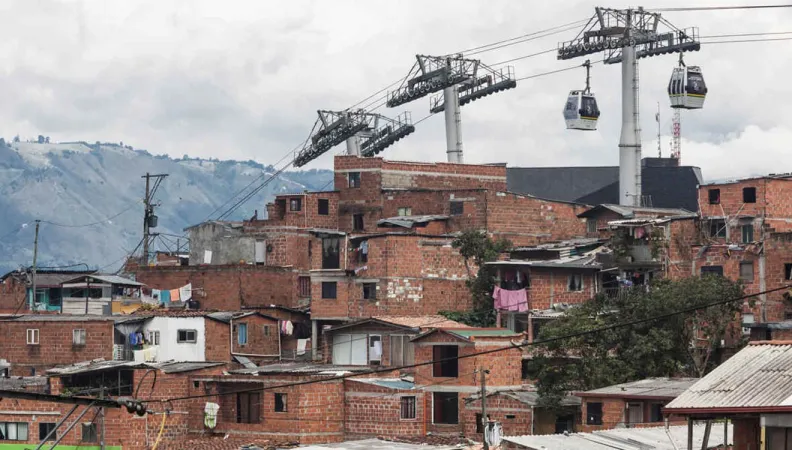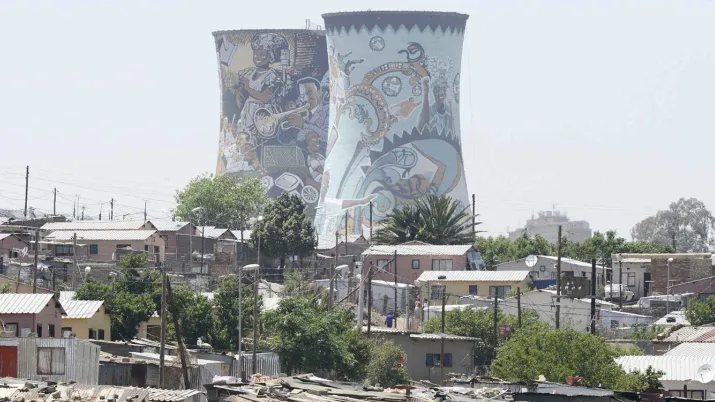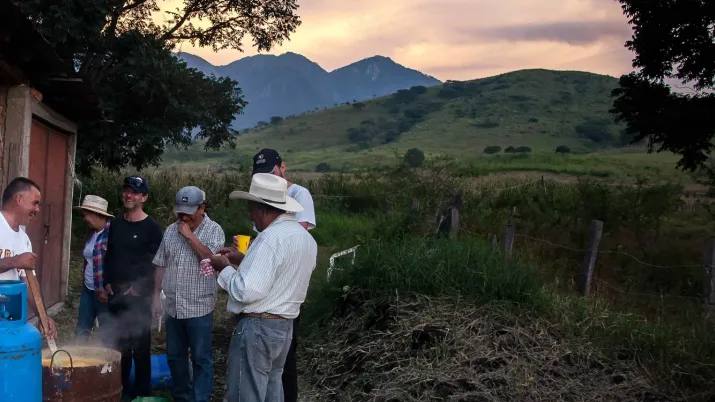Share the page
Extension of the Research Facility on Inequalities in Colombia

How to effectively reduce inequalities in Colombia? What policies should be implemented and how should taxation and public spending be addressed? AFD is working with local research centers and the Colombian government to try to answer these questions in the framework of the Extension of the EU-AFD Research Facility on Inequalities.
Context
Recent years have been marked by positive economic growth in Colombia with growth rates overall above 3% per year, which has enabled many people to escape poverty. Indeed, the poverty rate has decreased from 40.8% in 2012 to 35.7% in 2019. The signing of the Peace Accords between the government and the Revolutionary Armed Forces of Colombia (FARC) in 2016 also represented an opportunity to move forward towards building a more prosperous and equal country. However, despite these positive developments,
Colombia remains one of the most unequal countries in the region with a Gini coefficient between 0.55 and 0.6 according to the latest UNDP report. The Covid-19 pandemic has certainly reinforced these levels of inequality, particularly in terms of access to education and health.
READ ALSO
Objectives
In order to address this multidimensional issue, a program to support the development of public policies aimed at reducing inequalities will be implemented through the Extension of the EU-AFD Research Facility on Inequalities, in close collaboration with the Colombian government.
Preliminary research is underway in partnership with the Fedesarrollo research center, which is in charge of drafting a diagnostic of inequalities. This diagnostic, based on the Handbook developed during the first phase of the Facility, provides an overview of inequalities in the country on different themes (income, health, education, etc.). This multidimensional study will thus make it possible to identify priority areas of intervention for the reduction of inequalities in the country and will serve as a basis for further research and public policy dialogue between the various actors concerned. The diagnostic will also be a relevant tool to accompany the Colombian government in the implementation of programs that have an effect on the reduction of inequalities.
In addition, the topic of tax policy and public spending was also raised in prior consultations with various Colombian stakeholders and thus emerged as a focus for the Extension of the Research Facility on Inequalities. Research work was initiated using the Commitment to Equity (CEQ) methodology. This study will permit to evaluate the impacts of a set of public policies that could be implemented to reduce inequalities in the country in close collaboration with the Colombian government.
In parallel, the Extension of the Facility will produce, in partnership with DANE, a statistical study on inequality in Colombia. It will strengthen the production of Colombian statistics on inequalities, making accurate and robust data available to the public. More generally, this study aims to support decision-making in terms of public policies and actions or reforms aimed at reducing inequalities in Colombia.
Projects
In order to support the Colombian government in the development of public policies aimed at reducing inequalities, the Extension of the EU-AFD Research Facility on Inequalities, in close collaboration with local research centers and local authorities, is implementing four projects:
- The elaboration of the Multidimensional Diagnostic on inequalities and the generation of statistics on inequalities with the DANE (National Administrative Department of Statistics). The diagnostic is a statistical overview of inequalities from multiple angles and seeks to support public policy decisions by providing key information for the reduction of the most important gaps in the country.
- The implementation of the fiscal incidence analysis through the methodology of the Commitment to Equity (CEQ), and the elaboration of a tool to perform micro-simulations, in close collaboration with the Ministry of Finances, which enabled us to assess the impact on inequalities of the latest tax reform in the country.
- A study on Green jobs, pension system and inequality after retirement in Colombia. This project seeks to contribute to the public policy debate by analysing the effects that scenarios of a green economic transformation may have on income inequality after retirement, via the reallocation of workers between the formal and informal labour markets.
- A study to analyse the impact of the General Participation System (GPS) strategy on reducing spatial inequalities in Colombia. The GPS is a public policy tool that organises the transfer of royalties from the government to territorial entities.
- An analysis of the impact of fiscal policies and social spending on gender inequalities in Colombia, using the CEQ tool.
Events
Several events were organised to present the research findings:
The closing workshop of the Extension of the Research Facility on Inequalities for Colombia took place on 4 June 2025 in Bogotá. This full-day event gathered together policymakers, researchers, civil society actors, and international cooperation partners to discuss research-based solutions to the country’s persistent inequalities—territorial, gender-based, and economic.
The conference was structured around four key panels and explored:
- The impact of fiscal policies on gender gaps,
- Territorial disparities and public resources allocation,
- The role of just transition strategies in promoting social equity,
- Financing mechanisms to support inclusive development.
This event marked the culmination of a four-year collaboration between AFD, the EU, and Colombian institutions, including 7 research projects aimed at informing public policies with robust, context-sensitive evidence. Sessions brought together representatives of the government (Ministry of Finance, Ministry of Labour and Pensions, Ministry of Equality), of local authorities, international institutions (World Bank, ECLAC), academia (Universidad de los Andes) and civil society (Accion Publica and a feminist activist).
With Colombia’s high inequality levels and strong national commitment to equitable development, this conference provided a platform for dialogue and action to help bridge social, territorial, and economic divides.
The event was opened by the Ministry of Equality, the Head of cooperation at the EU Delegation and the Director for AFD in Colombia.
The success of transition to a greener economy will not only be measured by decarbonization but also by the provision of alternatives that ensure inclusive development. Achieving fair inclusion requires robust social protection systems to support households that may face challenges during this transition.
Based on the results of a research project conducted by the Universidad de los Andes, the webinar explored prospective scenarios regarding the impact of the green transition on one key element of Colombia's social protection system: the pension system.
Key topics addressed in this webinar:
- The structural transformations linked to the green transition.
- Their implications for employment and social protection.
- The future of Colombia’s pension system in a greener economy.
- The equity implications of the green transition.
With:
- Oscar Becerra, Associate Professor, School of Economics, Universidad de los Andes
- Sebastian Nieto Parra, Head of Latin America and the Caribbean Unit at the OECD Development Centre
- Carl Bernadac, Director of the Economic Diagnostics and Public Policy Department, AFD
- Anda David, Senior researcher, AFD
The objective was to present the findings of the research paper to experts in the field and discuss the implications for the ongoing planning processes. The participants, among which DNP, DANE and IDB, have expressed their interest in the findings and have highlighted their relevance. As a result, the paper was used as an analytical input into the interministerial working group on green jobs.
On Wednesday, November 27, 2024, AFD, together with the European Union, the World Bank Group, and the Universidad de los Andes, hosted a seminar titled “The Gender Approach in the Analysis of the Impact of Fiscal and Spending Policies: The Case of the CEQ Institute Model in Colombia.”
The event, held at the AFD offices in Bogotá, created a space for dialogue among academics, public officials, and international cooperation actors around the importance of integrating a gender perspective into fiscal policy analysis. The discussions focused on how to incorporate a gender approach into the model, and how this can improve the understanding of the impacts of fiscal and social policies on gender gaps in Columbia.
The seminar underscored the relevance of applying the CEQ framework with a gender lens, aiming to better understand and address the impact of fiscal and spending policies on inequality.
Thanks to the diagnostic made for Colombia, this webinar has been the opportunity to look at different areas (income, education, public services, regions, etc.) from the perspective of inequalities, which allowed to see where there has been significant progress as well as where there is still room for improvement.
In this context, it also allowed us to look back at the recently adopted tax reform, and through a tax incidence analysis, examine the potential of the reform to reduce inequalities.
You can find the replay here.
This diagnostic provides an overview of inequalities in Colombia on different themes (income, health, education, etc.). It will thus make it possible to identify priority areas of intervention for the reduction of inequalities in the country and will serve as a basis for further research and public policy dialogue between the various actors concerned.
The replay of the launch of the multidimensional diagnosic is also available in spanish.
Other countries supported by the Extension of the Research Facility on Inequalities
Event
Bridging Divides: Evidence-Based Policies for Inequality Reduction and Sustainable Development
International conference of the EU-AFD Research Facility on Inequalities



